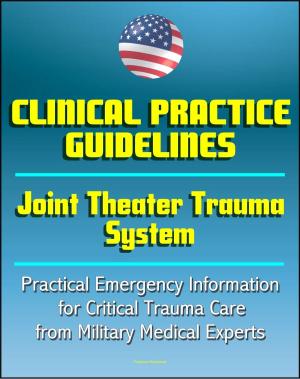21st Century Adult Cancer Sourcebook: Myelodysplastic Syndromes (MDS), Refractory Anemia, Refractory Cytopenia - Clinical Data for Patients, Families, and Physicians
Nonfiction, Health & Well Being, Health, Ailments & Diseases, Cancer| Author: | Progressive Management | ISBN: | 9781465711557 |
| Publisher: | Progressive Management | Publication: | October 19, 2011 |
| Imprint: | Smashwords Edition | Language: | English |
| Author: | Progressive Management |
| ISBN: | 9781465711557 |
| Publisher: | Progressive Management |
| Publication: | October 19, 2011 |
| Imprint: | Smashwords Edition |
| Language: | English |
Authoritative information and practical advice from the nation's cancer experts about Myelodysplastic Syndromes (MDS) and refractory anemia includes official medical data on signs, symptoms, early detection, diagnostic testing, risk factors and prevention, treatment options, surgery, radiation, drugs, chemotherapy, staging, biology, prognosis, and survival, with a complete glossary of technical medical terms and current references.
Starting with the basics, and advancing to detailed patient-oriented and physician-quality information, this comprehensive in-depth compilation gives empowered patients, families, caregivers, nurses, and physicians the knowledge they need to understand the diagnosis and treatment of MDS.
Comprehensive data on clinical trials is included - with information on intervention, sponsor, gender, age group, trial phase, number of enrolled patients, funding source, study type, study design, NCT identification number and other IDs, first received date, start date, completion date, primary completion date, last updated date, last verified date, associated acronym, and outcome measures.
Myelodysplastic syndromes are a group of diseases in which the bone marrow does not make enough healthy blood cells. Normally, the bone marrow makes blood stem cells (immature cells) that develop into mature blood cells over time. A blood stem cell may become a myeloid stem cell or a lymphoid stem cell. The lymphoid stem cell develops into a white blood cell. The myeloid stem cell develops into one of three types of mature blood cells: Red blood cells that carry oxygen and other materials to all tissues of the body; white blood cells that fight infection and disease; and platelets that help prevent bleeding by causing blood clots to form.
In myelodysplastic syndromes, the blood stem cells do not mature into healthy red blood cells, white blood cells, or platelets. The immature blood cells, called blasts, do not function normally and either die in the bone marrow or soon after they enter the blood. This leaves less room for healthy white blood cells, red blood cells, and platelets to develop in the bone marrow. When there are fewer blood cells, infection, anemia, or easy bleeding may occur.
There are several types of myelodysplastic syndromes. Myelodysplastic syndromes have too few of one or more types of healthy blood cells in the bone marrow or blood. Myelodysplastic syndromes include the following diseases:
* Refractory anemia.
* Refractory anemia with ringed sideroblasts.
* Refractory anemia with excess blasts.
* Refractory anemia with excess blasts in transformation.
* Refractory cytopenia with multilineage dysplasia.
* Myelodysplastic syndrome associated with an isolated del(5q) chromosome abnormality.
* Unclassifiable myelodysplastic syndrome.
Extensive supplements, with chapters gathered from our Cancer Toolkit series and other reports, cover a broad range of cancer topics useful to cancer patients. This edition includes our exclusive Guide to Leading Medical Websites with updated links to 81 of the best sites for medical information, which let you quickly check for updates from the government and the best commercial portals, news sites, reference/textbook/non-commercial portals, and health organizations. Supplemental coverage includes:
Levels of Evidence for Cancer Treatment Studies
Glossary of Clinical Trial Terms
Clinical Trials Background Information and In-Depth Program
Clinical Trials at NIH
How To Find A Cancer Treatment Trial: A Ten-Step Guide
Taking Part in Cancer Treatment Research Studies
Access to Investigational Drugs
Clinical Trials Conducted by the National Cancer Institute's Center for Cancer Research at the National Institutes of Health Clinical Center
Taking Time: Support for People with Cancer
Facing Forward - Life After Cancer Treatment
Chemotherapy and You
Authoritative information and practical advice from the nation's cancer experts about Myelodysplastic Syndromes (MDS) and refractory anemia includes official medical data on signs, symptoms, early detection, diagnostic testing, risk factors and prevention, treatment options, surgery, radiation, drugs, chemotherapy, staging, biology, prognosis, and survival, with a complete glossary of technical medical terms and current references.
Starting with the basics, and advancing to detailed patient-oriented and physician-quality information, this comprehensive in-depth compilation gives empowered patients, families, caregivers, nurses, and physicians the knowledge they need to understand the diagnosis and treatment of MDS.
Comprehensive data on clinical trials is included - with information on intervention, sponsor, gender, age group, trial phase, number of enrolled patients, funding source, study type, study design, NCT identification number and other IDs, first received date, start date, completion date, primary completion date, last updated date, last verified date, associated acronym, and outcome measures.
Myelodysplastic syndromes are a group of diseases in which the bone marrow does not make enough healthy blood cells. Normally, the bone marrow makes blood stem cells (immature cells) that develop into mature blood cells over time. A blood stem cell may become a myeloid stem cell or a lymphoid stem cell. The lymphoid stem cell develops into a white blood cell. The myeloid stem cell develops into one of three types of mature blood cells: Red blood cells that carry oxygen and other materials to all tissues of the body; white blood cells that fight infection and disease; and platelets that help prevent bleeding by causing blood clots to form.
In myelodysplastic syndromes, the blood stem cells do not mature into healthy red blood cells, white blood cells, or platelets. The immature blood cells, called blasts, do not function normally and either die in the bone marrow or soon after they enter the blood. This leaves less room for healthy white blood cells, red blood cells, and platelets to develop in the bone marrow. When there are fewer blood cells, infection, anemia, or easy bleeding may occur.
There are several types of myelodysplastic syndromes. Myelodysplastic syndromes have too few of one or more types of healthy blood cells in the bone marrow or blood. Myelodysplastic syndromes include the following diseases:
* Refractory anemia.
* Refractory anemia with ringed sideroblasts.
* Refractory anemia with excess blasts.
* Refractory anemia with excess blasts in transformation.
* Refractory cytopenia with multilineage dysplasia.
* Myelodysplastic syndrome associated with an isolated del(5q) chromosome abnormality.
* Unclassifiable myelodysplastic syndrome.
Extensive supplements, with chapters gathered from our Cancer Toolkit series and other reports, cover a broad range of cancer topics useful to cancer patients. This edition includes our exclusive Guide to Leading Medical Websites with updated links to 81 of the best sites for medical information, which let you quickly check for updates from the government and the best commercial portals, news sites, reference/textbook/non-commercial portals, and health organizations. Supplemental coverage includes:
Levels of Evidence for Cancer Treatment Studies
Glossary of Clinical Trial Terms
Clinical Trials Background Information and In-Depth Program
Clinical Trials at NIH
How To Find A Cancer Treatment Trial: A Ten-Step Guide
Taking Part in Cancer Treatment Research Studies
Access to Investigational Drugs
Clinical Trials Conducted by the National Cancer Institute's Center for Cancer Research at the National Institutes of Health Clinical Center
Taking Time: Support for People with Cancer
Facing Forward - Life After Cancer Treatment
Chemotherapy and You















